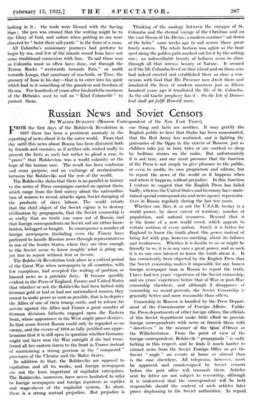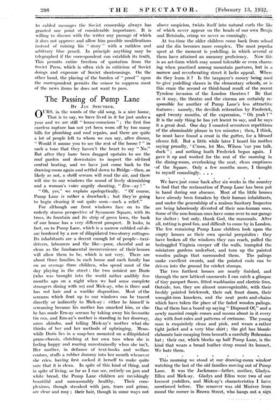d Soviet Censors Russian News an
spondent of the New York Times). By WALTER DURANTY (Moscow Corre FROM the first days of the Bolshevik Revolution in 1917 there has been a persistent anomaly in the reporting of news about it to the outer world. From that day until this news about Russia has been distorted both by friends and enemies, as if neither side wished really to present the facts as such but rather to plead a Case, to "prove" that Bolshevism was a world calamity or the hope of the human race. The result has been confusion and cross purpose, and an exchange of recrimination between the Bolsheviks and the rest of the world.
- The Bolsheiiks claiM that there is no parallel in history to the series of Press campaigns carried on against them, which range from the first outcry about the nationaliza- tion of women to recent attacks upon Soviet dumping of the products of slave, labour. The ,world retorts that the chief object of the Soviet regime is to destroy civilization by propaganda, that the Soviet censorship is so crafty that no truth can come out of Russia, and that foreign correspondents on Soviet soil are either brow- beaten, befogged or bought. In consequence a number of foreign newspapers (including even the Times) have preferred to handle, Russian news through representatives in one of the border States, where they are close enough to the Soviet scene to know roughly what is going on, yet free to report without fear or favour.
. The Bolshevik Revolution took place in a critical period of the Great War when newspapers in all countries, with few exceptions, had accepted the writing. of partisan or biassed news as. a patriotic duty. It became speedily evident to the Press of England, France and United States that whether or not the Bolsheviks had been bribed with German gold or had or had not nationalized women, they meant to make peace as soon as possible, that is to deprive the. Allies of one of their trump cards,. and to release for service against the Allies and France a great number of German. divisions . hitherto engaged upon the Eastern front, whose appearance in the West might prove deciSive. In that sense Soviet Russia could only be regarded as an enemy, and the events of 1918 so fully justified our appre- hensions that it is. still open to question whether Germany might not have. won the War outright if she had trans- ferred all her eastern forces to the front in France instead of maintaining a strong garrison in the " conquered, "
provinces of the Ukraine and the Baltic States. .
In addition to that, the Bolsheviks are opposed to capitalism and all its works, and foreign newspapers are, not the least important of capitalist enterprises. The Bolsheviks, moreover, have never hesitated to refer to. foreign newspapers and foreign reporters as reptiles and wage-slaves of the capitalist system. In short, there is a strong mutual prejudice. But prejudice is one thing and facts are another. It may gratify the English public to hear that Stalin has been assassinated, that the Red Army has mutinied, and is fighting the janissaries of the Ogpu in the streets of Moscow, just as children take joy in fairy tales or are soothed to sleep by bedtime stories on the radio. But unfortunately it is not true, and one must presume that the function of the Press is not simply to give pleasure to the public, or even to soothe its own proprietors and editors, but to report the news of the world as it happens when and where it happens, without prejudice. In this function I venture to suggest that the English Press has failed badly, whereas the United States and Germany have main- tained special correspondents and news agency representa- tives in Russia regularly during the last ten years.
Whether one likes it or not the U.S.S.R. to-day is a World power, by sheer extent of territory, number of population, and natural resources. Beyond that it is the home of a new world creed, which appeals to certain sections of every nation. Surely it is better for England to know the truth about this power instead of being fed with pap, however soothing: about its failures and weaknesses. Whether it is hostile to us or might be friendly to us, it is in any ease a great power, and as such it is to our own interest to know the truth about it. It has consistently been objected by the English Press that the Soviet censorship makes it impossible for any honest foreign newspaper man in Russia to report the truth. I'have had ten years' experience of the Soviet censorship, and six years' experience before that of War or post-War censorship elsewhere, and although I disapprove of censorship on moral grounds, the SOviet Censorship is generally better and more reasonable than others.
Censorship in Moscow is handled by the Press Depart- ment of the Commissariat of Foreign Affairs. Unlike the Press departments of other foreign offices, the officials of this Soviet department make little effort to provide foreign correspondents with news or furnish them with " directives " in the manner of the Quai d'Orsay or the Wilhelmstrasse. From the point of view of the foreign correspondent, Bolshevik " propaganda " is sadly lacking in this respect, and he finds it much harder to extract news from the Soviet Foreign Office or get the Soviet " angle " on events at home or abroad than
is the case elsewhere. All telegrams, however, t be approved and countersigned by Soviet censors before the post office will transmit them. Articles sent by letter are not subject to censorship, although it is understood that the correspondent will be held responsible should the content of such articles later prove displeasing to the Soviet authorities. In regard
to cabled messages the Soviet censorship always has granted one point of considerable importance. It is willing to discuss with the writer any passage of which it does not approve and allow him possible modifications instead of ruining his " story " with a ruthless and arbitrary blue pencil. In principle anything may be telegraphed if the correspondent can establish its truth. This permits entire freedom of quotation from the Soviet Press, which is often rich in criticism of Soviet doings and expoSure of Soviet shortcomings. On the other hand, the placing of the burden of " proof " upon the correspondent permits the censor to suppress most of the news items he does not want to pass.







































 Previous page
Previous page